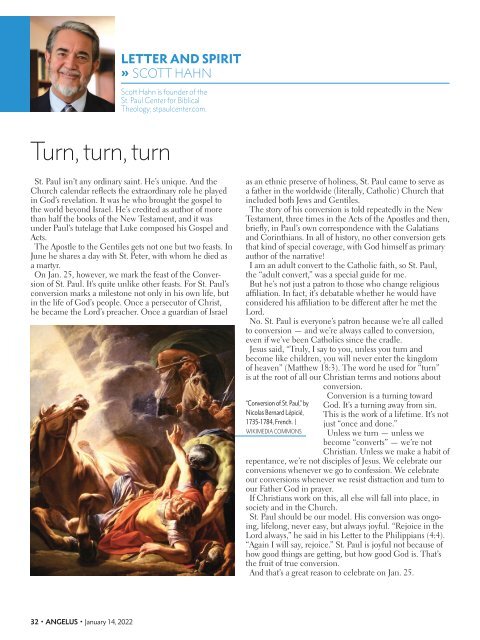Angelus News | January 14, 2022 | Vol. 7 No. 1
On the cover: It can be described as the sacrament of “penance,” “reconciliation,” or more simply, just “confession.” A necessary part of any serious Catholic’s spiritual life, certainly, but can it be something more? On Page 10, Mike Aquilina invokes the life and example of St. Pope John Paul II to make the case that confession is much more than a duty, but actually a right — and perhaps our best shot at the radical conversion God wants to give us.
On the cover: It can be described as the sacrament of “penance,” “reconciliation,” or more simply, just “confession.” A necessary part of any serious Catholic’s spiritual life, certainly, but can it be something more? On Page 10, Mike Aquilina invokes the life and example of St. Pope John Paul II to make the case that confession is much more than a duty, but actually a right — and perhaps our best shot at the radical conversion God wants to give us.
You also want an ePaper? Increase the reach of your titles
YUMPU automatically turns print PDFs into web optimized ePapers that Google loves.
LETTER AND SPIRIT<br />
SCOTT HAHN<br />
Scott Hahn is founder of the<br />
St. Paul Center for Biblical<br />
Theology; stpaulcenter.com.<br />
Turn, turn, turn<br />
St. Paul isn’t any ordinary saint. He’s unique. And the<br />
Church calendar reflects the extraordinary role he played<br />
in God’s revelation. It was he who brought the gospel to<br />
the world beyond Israel. He’s credited as author of more<br />
than half the books of the New Testament, and it was<br />
under Paul’s tutelage that Luke composed his Gospel and<br />
Acts.<br />
The Apostle to the Gentiles gets not one but two feasts. In<br />
June he shares a day with St. Peter, with whom he died as<br />
a martyr.<br />
On Jan. 25, however, we mark the feast of the Conversion<br />
of St. Paul. It’s quite unlike other feasts. For St. Paul’s<br />
conversion marks a milestone not only in his own life, but<br />
in the life of God’s people. Once a persecutor of Christ,<br />
he became the Lord’s preacher. Once a guardian of Israel<br />
as an ethnic preserve of holiness, St. Paul came to serve as<br />
a father in the worldwide (literally, Catholic) Church that<br />
included both Jews and Gentiles.<br />
The story of his conversion is told repeatedly in the New<br />
Testament, three times in the Acts of the Apostles and then,<br />
briefly, in Paul’s own correspondence with the Galatians<br />
and Corinthians. In all of history, no other conversion gets<br />
that kind of special coverage, with God himself as primary<br />
author of the narrative!<br />
I am an adult convert to the Catholic faith, so St. Paul,<br />
the “adult convert,” was a special guide for me.<br />
But he’s not just a patron to those who change religious<br />
affiliation. In fact, it’s debatable whether he would have<br />
considered his affiliation to be different after he met the<br />
Lord.<br />
<strong>No</strong>. St. Paul is everyone’s patron because we’re all called<br />
to conversion — and we’re always called to conversion,<br />
even if we’ve been Catholics since the cradle.<br />
Jesus said, “Truly, I say to you, unless you turn and<br />
become like children, you will never enter the kingdom<br />
of heaven” (Matthew 18:3). The word he used for “turn”<br />
is at the root of all our Christian terms and notions about<br />
conversion.<br />
“Conversion of St. Paul,” by<br />
Nicolas Bernard Lépicié,<br />
1735-1784, French. |<br />
WIKIMEDIA COMMONS<br />
Conversion is a turning toward<br />
God. It’s a turning away from sin.<br />
This is the work of a lifetime. It’s not<br />
just “once and done.”<br />
Unless we turn — unless we<br />
become “converts” — we’re not<br />
Christian. Unless we make a habit of<br />
repentance, we’re not disciples of Jesus. We celebrate our<br />
conversions whenever we go to confession. We celebrate<br />
our conversions whenever we resist distraction and turn to<br />
our Father God in prayer.<br />
If Christians work on this, all else will fall into place, in<br />
society and in the Church.<br />
St. Paul should be our model. His conversion was ongoing,<br />
lifelong, never easy, but always joyful. “Rejoice in the<br />
Lord always,” he said in his Letter to the Philippians (4:4).<br />
“Again I will say, rejoice.” St. Paul is joyful not because of<br />
how good things are getting, but how good God is. That’s<br />
the fruit of true conversion.<br />
And that’s a great reason to celebrate on Jan. 25.<br />
32 • ANGELUS • <strong>January</strong> <strong>14</strong>, <strong>2022</strong>


















